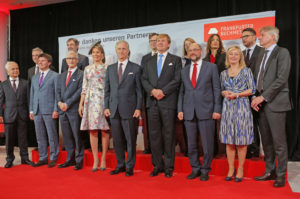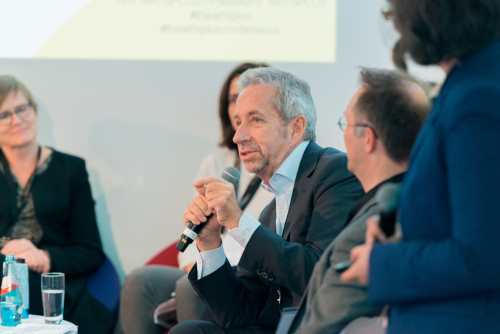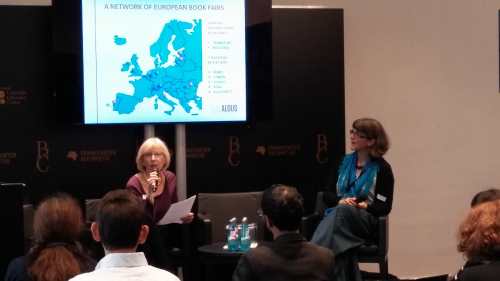A European newcomer to this year’s Frankfurt Book Fair was ALDUS, the network of European book fairs. “The Frankfurt Book Fair has long-established ties with over 20 book fairs all around the world. But we realised what we really need is a much stronger network of fairs within Europe, which can invest in the greater professionalism of its programmes and projects, and help its members learn from each other” said Holger Volland, Vice President of the Frankfurt Book Fair. ALDUS provides that network: Through collective events, and dedicated networking and training activities, it fosters the cross-border mobility of European literary works and book professionals. It is a partnership featuring two leading international trade book fairs (Frankfurt and Bologna) as well as a variety of national book fairs (Rome, Vilnius, Riga, Lisbon and Bucharest). As the project progresses, it will develop into a fully pan-European network.
A range of more than 10 ALDUS events organized plus a strong presence by the European Commission showed that Frankfurt was a „truly European fair“ this year. “Frankfurt is just a three-and-a-half hour train ride from Brussels,” said Juergen Boos, Director of the Frankfurt Book Fair a few days before the opening of the Fair. “But for many people, Brussels is a ‘black box’, an unknown territory. We want to change that and bring it closer to us all, because we think Brussels and the European Union are important – not only for book publishing, but for us as citizens and for our societies. I am happy to say, our efforts are bringing results. This year’s Frankfurt Book Fair is a truly European one. Despite the crises and despite Brexit, the European book sector has a full presence in Frankfurt – a sign of the strong network that European publishers and booksellers have established.”
Why is a network of European book fairs so important? What did the events taking place in Frankfurt show us?
- Book fairs are spaces for a free exchange of opinions and ideas – and spaces to defend the freedom of expression. Spaces like these are getting more and more rare in the world, also in Europe. Turkey is just one example: The keynote speech at this year’s opening ceremony of the Frankfurt Book Fair on Tuesday evening was held by Martin Schulz, President of the European Parliament and a bookseller by profession (here you can view the German version). Schulz said: “As Europeans, we have sworn to each other to do things better in this century than we did in the last. Now we have to prove it.“ He expressed his solidarity with the appeal from the German book industry #Freewordsturkey, which calls on the German government, but also on the EU Commission, to push for the release of all imprisoned authors and journalists in Turkey – more than 140 journalists and authors are currently behind bars. With the words “Let these people go,” Martin Schulz adressed himself directly to the Turkish government and Turkish President Recep Tayyip Erdogan.

Opening Ceremony Frankfurt Book Fair “Family Portrait” (from left to right): Peter Feldmann, Uwe Behm, Stefanie Waibel, Charlotte van den Broeck, Arnon Grünberg, Roland Broekhout, Tracey L. Armstrong, Sonia Khan, Boris Rhein, Heinrich Riethmüller, Sven Gatz, Geert Bourgeois, Queen Mathilde, King Philippe, King Willem-Alexander, Martin Schulz, Dr Jet Bussemaker, Juergen Boos. Copyright: Alexander Heimann
- Book fairs help societies to make sense of a more and more complex world – and they mirror the growing complexity of this world at the same time. Climate change and wars, migration, a seeming perpetuity of financial crises in Europe, major changes triggered by globalization and digitization: the world seems more complex with every day. A rise of populist movements all over Europe shows that people seem to crave simplistic solutions and strong leaders – but it also shows a growing alienation between „the establishment“ and „the citizens“. Book fairs are one of the few places where people gather to learn more about the world, trying to understand it better. They are also places of exchange, of trying to come to terms with complexity: “We must raise our voices,” said Juergen Boos, director of the Frankfurt Book Fair at the opening ceremony of the fair in Frankfurt. Quoting Timothy Garden Ash, he demanded “a culture of open discussion and of robust civility.” “What we are experiencing is a kind of complexity that cannot be easily understood. We are observing a new one-dimensionality in political views, where national and religious identities are pitted against each other.” He said he sees the world’s biggest book fair as a place where “the fragmentation of the world, as well as its diversity” become particularly apparent. Boos quoted Italian author Umberto Eco, who died earlier this year, in saying, “Literature can help to sort out the world.”
- Book fairs can support a professional exchange between policy and industry on a national and international level.

Breaking the mould: Building an innovation network for the creative industries: Jens Nymand Christensen of the European Commission/ Directorate General Eduation and Culture
European policies and regulatory frameworks are becoming more and more important for publishing – starting from copyright to VAT to data protection, to open access and including many more issues. Fostering encounters between the EU and professional stakeholders from book publishing is what book fairs can do, thus trying to open up the „Brussel’s bubble“. Two EU Commissioners visited Frankfurt: Firstly, Carlos Moedas, Commissioner for Research, Science and Innovation, spoke at the STM Frankfurt Conference 2016, which was devoted to “Scholarly publishing 2020: Innovation beyond the curve”. As a fierce advocate of open access, his talk on “Open Science – What is next” sparked a lively debate. Secondly, Günther Oettinger, Commissioner for Digital Economy & Society, spoke at an event devoted to “CONTENTshift”, a new European accelerator for start-ups and a project of the German Publishers and Booksellers Association. The Federation of European Publishers (FEP) and the European and International Booksellers Federation (EIBF) were organising several events at the Book Fair. The European digital library, Europeana, and the EU Commission’s Directorate General for Culture and Education both enjoyed a strong presence as partners in the newly launched fair for the creative industries, THE ARTS+. A high-level workshop called “THE ARTS+: The Politics of Creativity”, organised in cooperation with the European Commission’s Directorate General for Education and Culture asked: How do we build a European innovation network for the creative sectors? The creative sectors are drivers of jobs and growth, and they show a remarkable resilience even in times of crisis. At the same time, they face a high pressure to innovate and they need to access finance and knowledge, such as that provided through programmes like the EU’s Horizon2020 and Creative Europe , or through regional and national innovation support infrastructure and initiatives. Europeana, which provides online access to millions of digitised items from European museums, libraries, archives and multi-media collections, was also a partner for THE ARTS+, in the “Europeana Lab”. In a multidisciplinary workshop, a team of 25 experts and design students tapped the full potential of cultural archives and develop new business models for cultural content in the digital age.
- Book fairs can learn from each other – and can form a strong network in Europe.

Saturday Workshop: Presenting best practice cases for literature promotion. with: Bärbel Becker and Nina Klein, Frankfurt Book Fair
„Reading Europe – new approaches to the promotion and networking of European book markets“ was the title of a workshop held on Saturday 23 October. Around 30 book professionals active in the promotion of literature and books had gathered there to discuss questions like: How can collective stands at book fairs be made more interactive – and European? How can we attract more European authors to appear at book fairs? How would it be possible to nurture the inter-European licensing trade? How can European publishers network more effectively? The workshop kickstarted a four-year strategy process intended to develop the promotion of literature across Europe through building a sustainable and professional network of European book fairs. To get the discussion going, the Frankfurt Book Fair presented best practice cases from its own portfolio: Bärbel Becker introduced the work of the international department of the fair, which has a wide portfolio of measures to connect and professionalize book markets. The Guest of Honour format is probably the best known one – and was invented by the Fair in the 1980s, putting a country or a region into the cultural spotlight. Germany was just recently Guest of Honour at the Istanbul Book Fair, and the presentation was organized by Bärbel’s team. Collective stands are another measure which helps to create tighter connections between professionals, and support the licencing trade, as are book collections. Jenny Kühne, Rights and Licencing Manager, presented the manifold activities taking place in Frankfurt to support the trade of intellectual property, singling out the Frankfurt Rights Meeting (FRM), the biggest meeting of rights professionals in the world, which had hosted a debate about the effects of the European Union Prize of Literature (EUPL) on the rights and licencing trade a few days earlier. Jenny also introduced platforms like IPR Licence, which allows rightsholders to manage (micro)-rights and payments. Niki Théron presented professionalization and exchange programmes such as the Fellowship Programme and the Goldschmidt Programme – all of them aiming to create ties between young and aspiring professionals, and thus a strong network of „book people“ around the world. Ideas on how these best practice cases could be applied elsewhere at book fairs – and how they could take on a truly European strand – where discussed in small workshops following the presentations. The outcomes will be published soon – stay tuned!

















